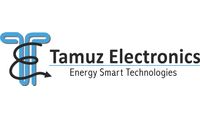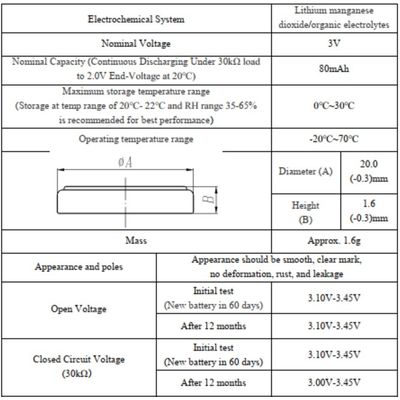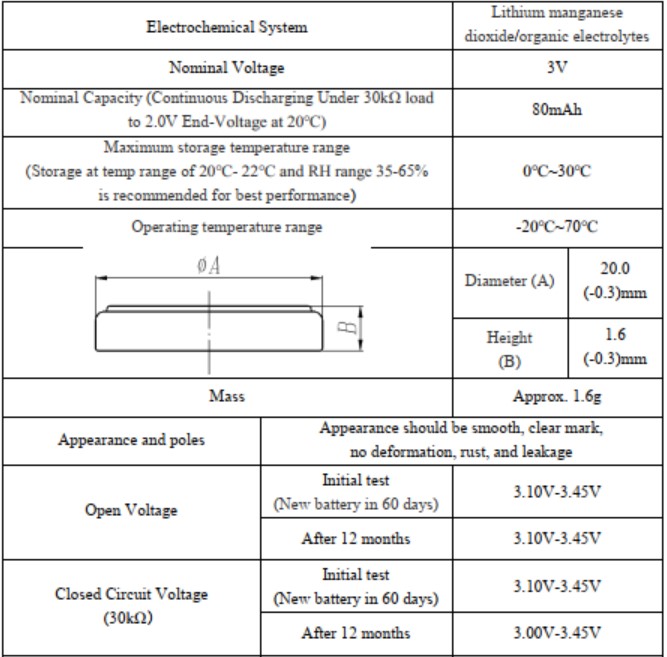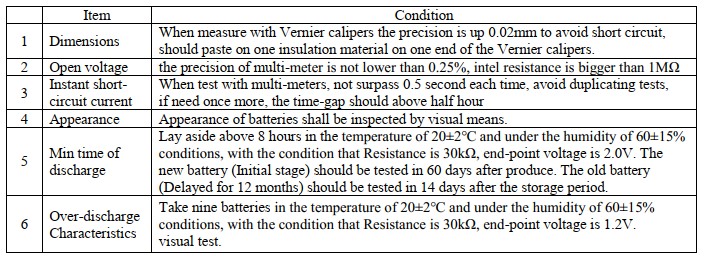

- Home
- Companies
- Tamuz Electronics Ltd.
- Products
- Tamuz - Model P/N: CR2016-A00 - Primary ...

Tamuz - Model P/N: CR2016-A00 -Primary Lithium Battery
This specification applies to Lithium Manganese Dioxide 3V coin battery model P/N: CR2016-A00 made by Tamuz Electronics Ltd. The product is UL1642 approved and meet the standards of GB8897-2008 and EU directive 2006/66 / EC



5. Important Notes (Warranty)
5.1 Do Not swallow
Keep the battery out of reach of children. Never put batteries in mouth. If ingested, immediately seek medical
attention.
5.2 Do Not recharge
Forbid using any other power supply to charge the battery. Recharging can lead to produce gas and internal
short circuits, causing cell deformation, leakage, overheat, explode, or catch fire.
5.3 Do Not Dispose In Fire
The lithium will be melted when dispose in fire.
5.4 Do Not Disassemble
Do not disassemble the battery or it will cause the damage of gasket or the separator, deformation, leakage,
over-heat, explosion, or firing will happen.
5.5 Insert Batteries Correctly
Depending on the application device, incorrect insertion of batteries, with positive (+) and negative (-) poles
reversed, may result in short circuits and the risk of heat generation, fire or explosion.
5.6 Do Not Short-circuit
Do Not Short-circuit. Do not keep or store the battery with metal or it will cause deformation, leakage, over-heat,
explosion or firing. Do not take several pieces of batteries from the packing box at one time or stock mixed,
it can lead deformation, leakage, over-heat or firing
5.7 Do Not Mix Different Types Of Batteries
For some application, mixing different types of batteries, or new and old batteries, can cause over discharge due
to difference in voltage and electrical capacities. This may lead to the risk of swelling or explosion.
5.8 Do Not Weld Pin Or Wire Directly On The Battery
The lithium will melt when welding or cause damage of insulation material. This will lead deformation, overheat, explosion or firing. If weld is needed, please contact Tamuz or professional welder.
6. Cautions
6.1 Shaking, jumbling, Scatters or trampled batteries may cause short circuits, heat generation, fire or explosion.
6.2 Install batteries, please be careful when operating, don’t let the battery come into contact with metal objects
could make the battery short circuit.
6.3 Selecting suitable batteries as the operation instructions.
6.4 Do not use or store the batteries in high-temp places like exposure sunshine or in car which in burning hot,
it will lead deformation, leakage, over-heat, explosion or firing.
6.5 Do not let the battery contact water or store in a wet environment or it will cause rust, deformation, leakage,
over-heat, explosion, or firing.
6.6 The voltage may lower than target one by bad contact so please keep 2N contact pressure.
6.7 If any questions please contact Tamuz.
7. Storage Environment
The storage environment should be clean, cool, dry, ventilation, do not close to high-temp or high moisture, the
environment temp should 0?-30?, RH not exceed 75%.
8. Marking and Packing
8.1 Sign Of Positive Pole
8.2 Date Code(Date code is selective and need to pay extra charge)
If customers need date code as IEC standard with 2 words: ??, the first one expresses year by 0-9,
the second one expresses Jan-Sep by 1-9, O, Y, Z means Oct-Dec.
Examples: 81 means manufactured in Jan-2018 ; means manufactured in Oct-2018 ;
8Y means manufactured in Nov-2018 ; 8Z means manufactured in Dec-2018.
* Remark: Different date code can be made.
8.3 Packing
Each 20pcs in a PVC tray, 25 trays (500pcs) be packed by PVC film, 6 small packages in one inner box,
2 inner boxes (6,000pcs) in an outer carton.
* If the batteries need to be with pins, the packing will be changed by product appearance.
Electrochemical System:
Lithium manganese dioxide/organic electrolytes
Nominal Voltage:
3V
Maximum storage temperature range:
0?~30?
Normal operating temperature:
-20?~70?
Appearance and poles:
Appearance should be smooth, clear mark, no deformation, rust, and leakage
Open Voltage:
Initial test – 3.10V-3.45V | After 12 months 3.10V-3.45V
Closed Circuit Voltage:
Initial test – 3.10V-3.45V |After 12 months 3.00V-3.45V
Minimum Average Discharge Time:
Initial test ? 800h | After 12 months 750h
Electrolyte leakage at over discharge:
No Leakage
Self-discharge rate and shelf life:
2% per year with 3 years shelf life
